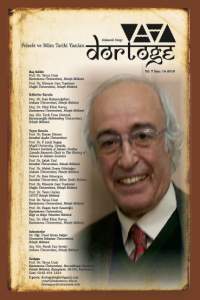Öz
This paper examines Gilles Deleuze’s critics and contributions to the Theory of Sense. Considering sense as a phenomenon of language, Deleuze revises the traditional philosophical understanding of the sense. According to him, sense is the pure event of the proposition. Sense has a special ontological status and maintains very special relations with nonsense. For Deleuze, sense cannot exist outside the proposition, but it is not exactly within it; sense is the transcendent condition of the proposition that exists before and after it. Sense is the fourth dimension of the proposition that comes along with its other functions such as denotation, manifestation, signification. Sense takes place in the structures formed by the interaction of the two series where one is the signifier and the other is the signified. According to Deleuze, random, and irregular structure with no center cannot determine sense. On the contrary, the structure is constructed by sense and thus becomes coherent.
Anahtar Kelimeler
Kaynakça
- Bardzell, J. (2009) Speculative grammar and stoic language theory in medieval allegorical nattative, Abingdon: Routledge.
- Deleuze, G. (1991). Empiricism and subjectivity: An essay in Hume’s theory of human nature. Trans. C.Boundas, New York: Columbia University Press.
- Deleuze, G. (1994). Difference and repetition. Trans. P.Patton, New York: Columbia University Press.
- Deleuze, G. (2015). Anlamın Mantığı, Çev. Hakan Yücefer, İstanbul: Norgunluk Yayıncılık.
- Deleuze, G. ve Guattari, F. (2001). Felsefe Nedir? Çev. T. Ilgaz. İstanbul: Yapı Kredi Yayınları.
- Demir-Atay, H. (2010). Reading the logic of sense as a psychological novel: Gilles Deleuze’s adventure with Lewis Carroll, Kaygı, 15 (Sayı), s. 61-69.
- Er, S. E. (2012). Gilles Deleuze’ün Fark Felsefesi, Konya: Çizgi Kitabevi.
- Frege, G. (1993) On sense and reference, in A.W. Moore (Ed.) Meaning and Reference, s. 23–42. Oxford: Oxford University Press.
- Kügler, P. (2011). “Sense, category, questions: Reading Deleuze with Ryle”, Deleuze Studie, 5.3, s. 324–339, Edinburgh University Press.
- Parr, Adrian (Ed.), (2005). The Deleuze dictionary, Revised edition, Edinburgh: Edinburgh University Press .
- Saussure, F. de. (1966). Course in general linguistics. Ed. by Ch.Bally, Transl. by W.Baskin. New York: McGraw-Hill Book Company.
- Voss, D. (2013). “Deleuze’s Rethinking of the Notion of Sense”, Deleuze Studies 7.1: 1–25 DOI:10.3366/dls.2013.0092, Edinburgh: Edinburgh University Press.
- Williams, J. (2008). Gilles Deleuze’s logic of sense: A critical introduction and guide, Edinburgh: Edinburgh University Press.
- Witttgenstein, L. (2010). Tractatus Logico-Philosophicus, Çev. O. Aruoba, İstanbul: Metis Yayınları.
- Zourabishvili, F. (2011). Deleuze Sözlüğü, Çev. A.U. Kılıç, İstanbul: Say Yayınları.
Öz
Bu çalışmada, Gilles Deleuze’ün anlam kuramına yaptığı eleştiriler ve katkılar değerlendirilecektir. Anlamın, dilin fenomeni olduğu varsayımına dayanan Deleuze, anlama dair klasik felsefedeki görüşleri gözden geçirmektedir. Ona göre, anlam önermede ifade edilen saf olaydır. Özel bir ontolojik statüye sahip olan anlam, anlamsızlıkla içsel ilişki içinde bulunmaktadır. Deleuze’e göre, anlam önermenin dışında var olamaz, ama tam olarak onun içinde de değildir; o önermenin öncesinde ve sonrasında da mevcut olan önermenin aşkın koşuludur. Anlam önermenin diğer işlevleriyle (denotation, manifestation, signification) birlikte meydana gelen önermenin dördüncü boyutudur. Dil düzleminde anlamın belirlenmesi, imleyen ile imlenen olmak üzere iki dizinin etkileşimiyle oluşan yapılarda gerçekleşmektedir. Deleuze’e göre, merkezi bulunmayan, rastlantısal ve düzensiz olan yapı, anlamı belirleyemez. Tersine, yapı anlamın belirlenmesiyle inşa edilir ve böylelikle tutarlık kazanır.
Kaynakça
- Bardzell, J. (2009) Speculative grammar and stoic language theory in medieval allegorical nattative, Abingdon: Routledge.
- Deleuze, G. (1991). Empiricism and subjectivity: An essay in Hume’s theory of human nature. Trans. C.Boundas, New York: Columbia University Press.
- Deleuze, G. (1994). Difference and repetition. Trans. P.Patton, New York: Columbia University Press.
- Deleuze, G. (2015). Anlamın Mantığı, Çev. Hakan Yücefer, İstanbul: Norgunluk Yayıncılık.
- Deleuze, G. ve Guattari, F. (2001). Felsefe Nedir? Çev. T. Ilgaz. İstanbul: Yapı Kredi Yayınları.
- Demir-Atay, H. (2010). Reading the logic of sense as a psychological novel: Gilles Deleuze’s adventure with Lewis Carroll, Kaygı, 15 (Sayı), s. 61-69.
- Er, S. E. (2012). Gilles Deleuze’ün Fark Felsefesi, Konya: Çizgi Kitabevi.
- Frege, G. (1993) On sense and reference, in A.W. Moore (Ed.) Meaning and Reference, s. 23–42. Oxford: Oxford University Press.
- Kügler, P. (2011). “Sense, category, questions: Reading Deleuze with Ryle”, Deleuze Studie, 5.3, s. 324–339, Edinburgh University Press.
- Parr, Adrian (Ed.), (2005). The Deleuze dictionary, Revised edition, Edinburgh: Edinburgh University Press .
- Saussure, F. de. (1966). Course in general linguistics. Ed. by Ch.Bally, Transl. by W.Baskin. New York: McGraw-Hill Book Company.
- Voss, D. (2013). “Deleuze’s Rethinking of the Notion of Sense”, Deleuze Studies 7.1: 1–25 DOI:10.3366/dls.2013.0092, Edinburgh: Edinburgh University Press.
- Williams, J. (2008). Gilles Deleuze’s logic of sense: A critical introduction and guide, Edinburgh: Edinburgh University Press.
- Witttgenstein, L. (2010). Tractatus Logico-Philosophicus, Çev. O. Aruoba, İstanbul: Metis Yayınları.
- Zourabishvili, F. (2011). Deleuze Sözlüğü, Çev. A.U. Kılıç, İstanbul: Say Yayınları.
Ayrıntılar
| Birincil Dil | Türkçe |
|---|---|
| Bölüm | Araştırma Makalesi |
| Yazarlar | |
| Yayımlanma Tarihi | 14 Aralık 2018 |
| Gönderilme Tarihi | 15 Ekim 2018 |
| Yayımlandığı Sayı | Yıl 2018 Sayı: 14 |


